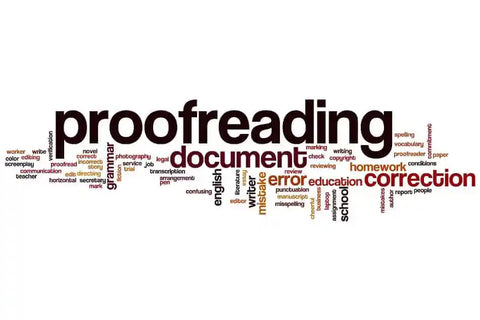提供校對人員需要的信息
聘請專業的學術或科學學校對人員始終是一個好主意,無論您是在努力構建清晰正確的句子,討厭擺弄格式,還是只是想要另一雙熟悉學術寫作慣例的敏銳眼睛,以確保您的寫作在提交給學術期刊發表之前達到完美狀態。專門從事學術和科學文獻工作的專業校對人員通常是語言專家,也是一個或多個其他領域的專家,他們的經驗往往使他們能夠深入了解客戶的願望和意圖,但他們並不是讀心者。校對員當然可以檢測出作者在文件的語言和格式中建立的任何模式並使其更加一致,但前提是作者的使用足夠一致以形成可檢測的模式。如果您的文件在拼字、格式和其他方面有太多變化和不一致,那麼即使是最優秀的校對員也可能無法準確知道您想要什麼,如果您的文件必須遵循特定的準則,那麼您的校對員就需要知道這些準則是什麼,以便為您提供最好的服務。因此,當您向校對員或編輯發送文件時,最好向他們提供盡可能多的信息,以下簡要列表可能會有所幫助。
• 您應該始終提供您希望在其中發表作品的期刊或期刊發布的作者說明或指南,無論您是將指南的副本與文件一起發送,還是與校對員共享資訊連結。
• 如果期刊沒有提供或提供很少的指導方針,而是建議計劃提交其作品的作者參考期刊上已經發表的文章,那麼您的校對員將需要查看這些樣本。如果文章是開放取用的,那麼分享您在準備論文時參考的文章連結就足夠了,但如果不是,您將需要隨文件一起提供副本。
• 以英語撰寫的學術文章必須遵循英式英語或美式英語的慣例。如果您提供的指南中表明了這種偏好,您的校對員就會知道該怎麼做。如果不是,或者您沒有提供出版商指南,則需要告知校對員您使用的語言版本,以確保他或她在必要時相應地調整您的文字。
• 學術和科學文章中的標點符號模式應盡可能一致,但期刊提供的作者說明很少提供這方面的建議,因此,如果您擔心標點符號可能不夠一致,無法為校對員提供其所需的信息,最好指定您的偏好。例如,您是否希望使用連續逗號(或牛津逗號)?你的校對員肯定想知道。
• 學術期刊提供的大多數指南都會指出應使用的參考文獻格式,並提供一些範例。如果以已發表的文章作為樣本,它們也將顯示大部分必要的資訊。但是,如果您沒有遵循特定的指南或範例,則需要讓校對員知道您希望使用什麼文件樣式。此外,由於許多期刊沒有提供為不常見的來源生成完整參考文獻所需的所有信息,因此您為參考文獻設計的任何特殊格式都需要與校對員共享,以便他或她可以保留和模仿它。
為什麼選擇我們的編輯和校對服務?
在 Proof-Reading-Service.com,我們透過龐大且極其敬業的學術和科學專業團隊提供最高品質的期刊文章編輯、論文校對和線上校對服務。我們所有的校對人員都是英語母語人士,擁有研究生學位,他們的專業領域涵蓋了廣泛的學科,因此我們能夠幫助我們的國際客戶進行研究編輯,以改進和完善各種學術手稿,從而成功出版。我們的稿件編輯和校對團隊中許多經過精心培訓的成員主要負責擬在學術期刊上發表的文章,運用嚴格的期刊編輯標準,確保每篇論文中使用的參考文獻和格式符合期刊對作者的指示,並糾正任何語法、拼寫、標點或簡單的打字錯誤。透過這種方式,我們使客戶能夠以清晰準確的方式報告他們的研究,以打動收購校對員並實現出版。
我們為各種科學期刊論文的作者提供的科學校對服務尤其受歡迎,但我們也提供手稿校對服務,並擁有校對和編輯所有學術學科以及其他學科手稿的經驗和專業知識。我們的團隊成員專門從事醫學校對服務,我們的一些專家專門致力於論文校對和手稿校對,透過最嚴格的博士論文編輯和期刊文章校對實踐,為學者提供提高格式和語言使用能力的機會。無論您是準備會議論文以供展示,完善進度報告以供與同事分享,還是面臨編輯和完善任何類型學術文獻以供出版的艱鉅任務,我們專業團隊的合格成員都可以提供寶貴的幫助,讓您對您的書面作品更有信心。
如果您正在為學術或科學期刊準備一篇文章,或者計劃在不久的將來實現這一目標,那麼您可能會對一本新書《期刊出版指南》感興趣,該書可在我們的「期刊發表研究成果的技巧和建議」網站上找到。








